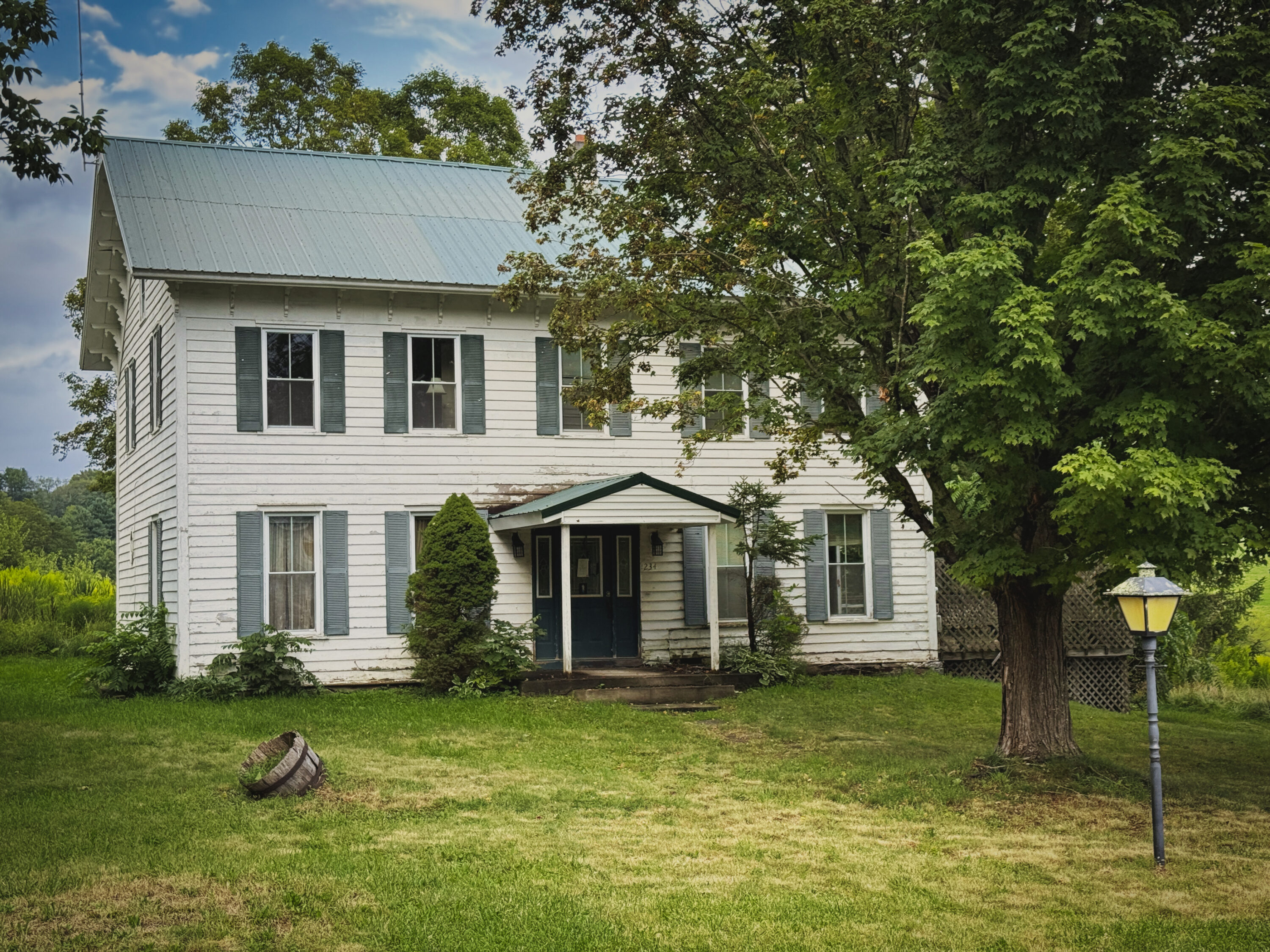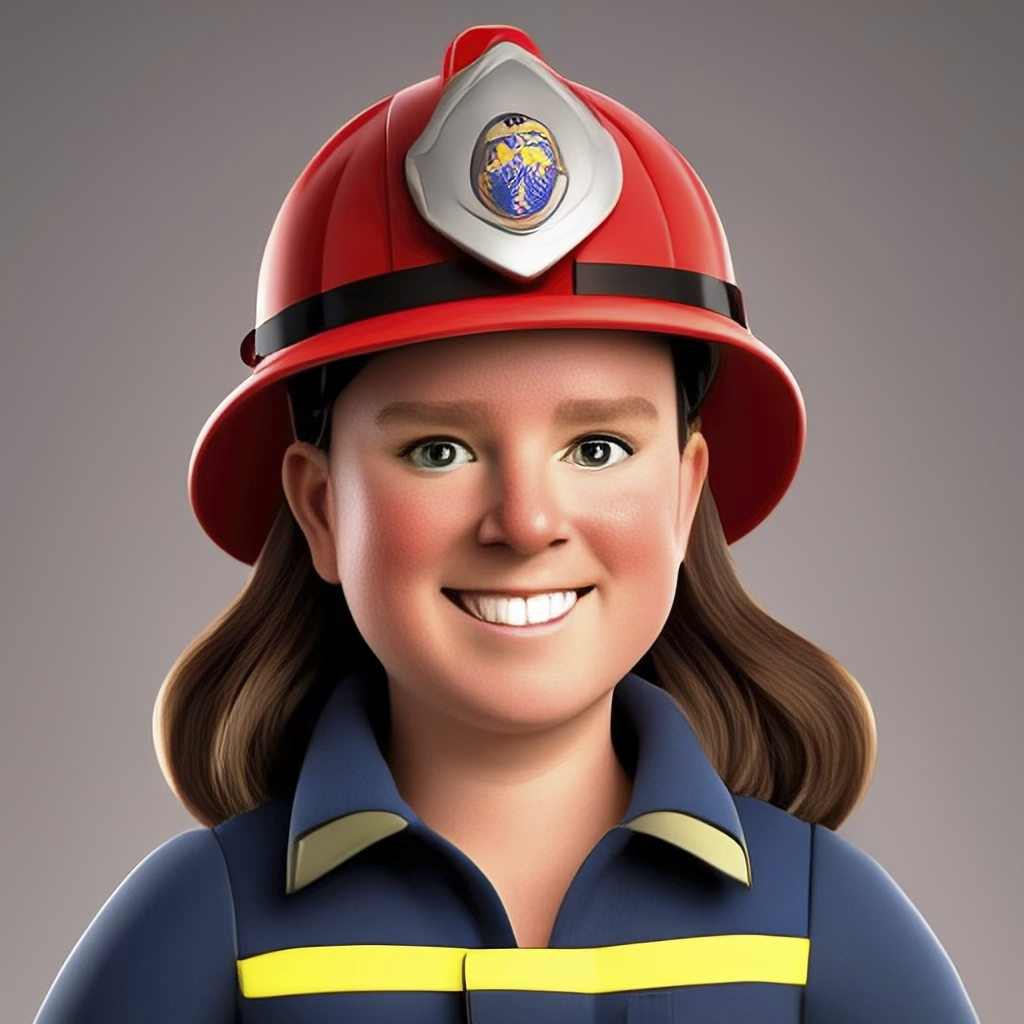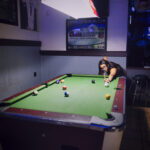I am sitting on the edge of my childhood bed, the same twin bed I slept in decades ago. The house is quiet aside from the low hum of cars passing and the soft strains of Pearl Jam’s Ten album playing on my phone. I’ve got the window cracked open—just like I used to—and I lit one up to calm my nerves.
The smell of the smoke mingles with the familiar mustiness of this old room. It’s a bittersweet comfort, an almost-forgotten ritual bringing me back to a time when life was simpler and my biggest worry was sneaking out after dark.
Today was heavy. I drove to Cooperstown to visit Mom in the hospital. Walking into her room, I was struck by how small she looked in that big white bed. She smiled when she saw me, but I could see the exhaustion in her face, the kind of weariness that doesn’t go away with rest. We talked in gentle tones about ordinary things at first—the weather, the quirky nurse who takes care of her at home, my aunt—both of us skirting the unspoken fear hanging in the air. Then Mom spoke of dying. In a quiet, matter-of-fact voice, she told me that if something happens and it’s unlikely she’ll recover fully, she doesn’t want to be revived.
She said it so plainly, as if discussing what to have for dinner. But I felt my heart drop into my stomach. Hearing your own mother talk about a Do Not Resuscitate wish—about letting go—is a punch I was not ready for.
I managed to nod and force a tiny smile as my throat tightened. I didn’t want her to see me cry, so I blinked hard and squeezed her hand, letting her words settle heavily between us.
On the drive back to Mom’s house, I barely remember the scenery. I must have driven the same familiar country roads as always—past the faded red barn, the cornfields, the little ice cream stand closed for the season—but my mind was elsewhere. Mom’s words were echoing in my head, and I kept picturing her frail smile as she talked about not coming back.

On the way home, I turned down Wilcox Road in Harpersfield, needing to see the house where my best friend Matt once lived. That place had been my second home for a while—so many nights spent in that barn, the basketball thumping against cracked concrete, the air thick with dust and laughter. We found an old Ford Fairlane parked in there too, and for a time it became ours, rattling down back roads like some forgotten prize waiting for us to claim it. I stopped in front of the house and took a picture from the road. It startled me how nothing had really changed. The CB radio antenna Matt and I rigged together still clings to the siding after all these years, stubborn as the memories themselves. His bedroom was up in the left corner window.
By the time I pulled into the driveway of my childhood home, dusk was falling. The house greeted me with silence. As soon as I shut the door behind me, the tears came. I didn’t even make it upstairs to my room; I just slid down against the front door, burying my face in my hands. I cried harder than I have in a long time—deep, gut-wrenching sobs that echoed in the quiet hallway. All the fear and sorrow I’d been holding in at the hospital came flooding out.
For a few minutes I was just a child again, a scared kid who didn’t want to lose her mom. My cries bounced off the old plaster walls and I wondered how long it has been since this house has heard me cry like that. It had—in secret, on those countless nights when teenage me felt lost and lonely in her own home.
After I calmed down a bit, I wiped my face, took a shaky breath, and headed up to my old bedroom. Pushing open the door was like opening a time capsule. Mom hasn’t changed much in here. The paint is the same ridiculous green trim on white plaster walls. I picked that shade out when I was 12, not realizing that mom would actually let me paint it that color.
All of my high school posters are gone, but the pin holes and tape marks remain like ghosts on the walls. A few cardboard boxes of Mom’s sewing supplies sit in the corner now, and the bookshelf has been emptied of my old paperbacks, but so much is still recognizable.
The tiny cracks in the ceiling plaster, the faded stickers on the closet door, the way the floorboards creak near the foot of the bed–it’s all the same.
Without even thinking, I reverted to my teenage habits. I dug out my ancient CD player from the closet and popped in Pearl Jam’s Ten, an album I must have played a thousand times in this very room. As soon as the opening riff started, I felt a wave of nostalgia wash over me. I shrugged off my skirt and t-shirt, stripping down to just my bra and panties like I always did when I wanted to feel free back then.
There’s something oddly liberating about being in your bare essentials, in the privacy of your own room–it was my little act of rebellion and comfort combined. I sat cross-legged on the floor for a while, eyes closed, letting the music and the familiar scent of home transport me back to 1996 for a few fleeting minutes.
I lit one up in homage to my own personal tradition, watching smoke curl lazily from my fingers as I walk slowly around the room, lingering over every corner and object. I run my fingertips gently over the wooden door frame, finding the tiny nicks and dents I left in the molding all those years ago. There’s a faint scratch by the closet where I once accidentally
knocked over a mirror. A little chip in the paint near the light switch from an angry moment with a slammed door. I trace each mark delicately with my fingers, reliving the story of a restless girl who grew up between these four walls.
Here I am, back in the room that once contained all my dreams and all my fears–the same room that would later witness my worst fights with Dad, the room I fled when I felt this house no longer accepted who I was, or who I was becoming.
I wander to the window, drawn by muscle memory. The storm window frame still sits slightly off-kilter, with a subtle droop on the left side. I remember exactly how it got that way. Countless summer nights I hoisted myself out of this window and onto the porch roof below, the metal screen pressing against the frame under my weight as I slipped out to chase midnight adventures.
That poor window has endured a lot from me. I press my palm against the glass, and it flexes just a bit in its aging wooden casing. Outside, the night is warm and cricket-chirpy, just like those nights decades ago when I’d sneak out. I used to sit on that roof for hours, smoking in the moonlight, staring at the stars and dreaming of anywhere-but-here.
I’d go roaming the quiet streets of Stamford, New York, exploring the abandoned hotels and houses, always seeking something–freedom, excitement, myself.
Mom would worry, of course. When I’d creep back in before dawn, she’d sometimes wake and catch me in the kitchen, muddy and grinning, and ask, “Where did you wander off to this time?” in that half-exasperated, half-concerned tone. I was her wild child, always wandering somewhere I shouldn’t.
I’ve always had a complicated relationship with my parents. With Dad it was outright tumultuous–we clashed in every way possible. He wanted a compliant, normal son who fit neatly into the Jewish family mold, and I was anything but that.
My father was convinced from the day I was born that I was his son, and he never let go of that fantasy. He pushed me toward boyhood at every turn, while my mother quietly raised me as the girl I knew I was. In the end, what they got was a lesbian daughter—something my mother had always seemed to anticipate and accept, while my father could never stomach it. He could never reconcile the truth of who I was with the story he had written for me, and that rift between us never healed.
Eventually, my differences became too much for him. We had explosive fights, especially in my late teens when I started to assert who I really was. This house—which once felt safe— became a battleground. By the time I left at 16, I swore I’d never come back. Dad’s love felt conditional; it was there only if I played by his rules, if I wasn’t “different.” And when I crossed that line, it vanished. In a way, this home did shun me for being different, just as I always feared it would.
Mom… well, Mom was different. She never kicked me out, never yelled the way Dad did. She was often there in person but somehow hard to reach, like her true self was locked behind a door I didn’t have the key to. She didn’t talk about feelings or dreams; she hovered in the periphery, tending to my basic needs, but rarely acknowledging the emotional storm in our family. Present physically, but emotionally absent–that was Mom through much of my childhood. I knew she cared deep down, yet I felt this distance that I could never bridge. Maybe she felt caught between Dad and me, I don’t know.
As I stand here in my old room, the events of today swirl together with all these old memories. I take a long drag, exhale slowly out the window, and let Pearl Jam continue to play softly in the background. Song after song—Alive, Black, Release—each one unlocking feelings I forgot I had.
When “Alive” comes on with its soaring chorus declaring I’m still alive, I feel a lump in my throat. That song used to make me feel invincible, like no matter how awful things got with Dad or how lonely I felt, I would survive and find my way.
Tonight it hits differently. I’m still alive…—and Mom is still alive—but for how long? The thought makes my chest tighten. I close my eyes and let the guitar solo wash over me, and for a moment I can almost pretend I’m a teenager again, invincible and certain that parents live forever.
It’s the final track, Release, that truly undoes me. Eddie Vedder’s voice is raw and pleading as he sings to his father he never knew. The line Oh dear Dad, can you see me now? drifts through the speakers and I feel it like a punch. I’ve reflected on those lyrics before, given my own father issues, but tonight they cut especially deep. I wonder, can Dad see me now? Does he care? Would he care if Mom… if something happened?
The rift between Dad and me is was wide as ever. Still, I can’t help but ache thinking how I’ve spent a lifetime seeking approval from a man who chose not to understand me up until the day he died. And now here I am, 46 years old, not that rebellious kid anymore, yet still craving acceptance from my parents in some form.
It’s almost funny in a tragic way–many years have passed, I’ve built my own life far from here, and still a part of me is standing at the edge of this roof, looking back, hoping to be seen. The song fades out and I realize I’m crying again, silently this time. Tears are rolling down my cheeks, warm and cathartic, as the night breeze slips in through the half-open window.
Mom’s question from earlier today keeps replaying in my mind: “Where did you wander to in life? What did you do? What have you accomplished? Are you happy?” She hadn’t asked me anything so direct, so personal, in decades. I can still see her eyes when she said it–a rare shine of curiosity, maybe even regret, as if she wished she’d asked sooner.
That moment broke something loose in me. I felt like that adventurous child again, proudly wanting to tell her all the places I explored. Yet I also felt the gulf of years and secrets between us. How could I possibly sum up my entire life for her in a few sentences? I mumbled something in the hospital–I don’t even remember what, something like “Oh, you know, I traveled, I worked hard, I made a life”–but I dodged the heart of her question. Am I happy?
I couldn’t say it then. I couldn’t say yes because… because I’m not sure. And I couldn’t say no because that would hurt her. So I deflected, and I saw the flicker of disappointment (or perhaps it was sadness?) in her eyes before she smiled and let it drop.
Now, in the quiet of this old house, I wish I could have answered her better. I wish I had the courage to be completely honest with her, the way she was honest with me about her final wishes. Where have I wandered in life? So many places, Mom. I’ve wandered across cities and countries, chasing dreams and fleeing demons. I’ve wandered through careers, through love and heartbreak, through therapy sessions and lonely nights.
What have I done, what have I accomplished? It depends on how you measure, I guess. I built a career I’m proud of, though it might not have sounded particularly impressive to Dad at the time.
I found friends who became my family when I needed one. I learned to love myself in a way I couldn’t under this roof. I survived life as an adult on the skills I learned while serving in the fire department.
Sometimes I think that’s my biggest accomplishment of all is that despite my struggles, I’m still here, still alive, still trying every day to be a better person than I was yesterday.
And am I happy? That question sits in the air, heavy and unanswerable in this moment. Happiness has always been a moving target for me. There have been times I truly was happy – I can picture those moments like snapshots: laughing until tears with my best friend on a road trip, feeling the ocean breeze on my face at a faraway beach, the day I finally stood up to my family and felt free.
And there have been long stretches of something less than happy, times I felt lost or unworthy, times I felt like that scared girl climbing out the window just to breathe. I think Mom asking me that made me realize that I do have happiness in my life, but I’m also afraid I haven’t done enough, that I haven’t become someone she’d be unequivocally proud of.
It’s crazy, I know she wasn’t trying to judge me with those questions–she was reaching out, trying to understand me at last. Maybe she senses the time to truly know each other is running out.
I wipe my eyes with the back of my hand and take another slow drag, staring out into the darkness. The orange glow flares and fades, and I watch a tiny ember break off and float into the night. In this moment I feel profoundly nostalgic and profoundly sad.
Nostalgic for the girl I was and the connection I wish I’d had with my parents back then. Sad that only now, when time is short, are Mom and I peeling back the layers and really talking.
I’m grateful, in a way, that she finally asked—that she cares about where I wandered and if I found what I was looking for. It’s more than I ever thought I would get from her emotionally.
But it also hurts, because it shines a light on all the years we didn’t share these things. The house is so still around me. Every creak of the floorboards as I shift my weight sounds louder than usual in the silence. I feel like if I listen hard enough, I might hear echoes of the past–distant laughter from when my friends and I would play with dolls, or the muffled shouting from the fights with Dad, or the riffs of an old
Pearl Jam song that I left imprinted on these walls. So much life happened here. So much of me is still here. I realize that despite the pain, this home and I are forever entwined. It shunned me, yes, or at least the people in it did, but it also shaped me.
Standing here now, I can almost make peace with that. Almost.
It’s late–far later than I’d normally stay up–but sleep is the last thing on my mind. I feel a strange calm after all the tears. Maybe it’s the exhaustion, or the stress, or the music, or some combination of all three.
I know tomorrow I’ll go back to the farm and wait for any updates from the hospital. I don’t know if she’ll bring up her questions a second time, the next time I see her but if she does, I want to try to answer, honestly. Or at least not shy away like I did.
She deserves that from me, and honestly, I deserve that too. We’ve lost enough time behind walls of polite small talk and unspoken truths. The night air is cool on my tear-stained face. The stars above the roof are exactly as I remember—countless and indifferent and eternal. I feel small under them, just as I did at sixteen, but also strangely hopeful that maybe I can still find some healing under this sky.
Mom is nearing the twilight of her years, and I’m firmly in mid-life, but in this moment I feel like a child and an old soul all at once. Grief and nostalgia are tangled up inside me, pulling me backwards and forwards in time.
I take one last puff and stub it out on the old windowsill, right in the little ash spot I created there years ago. The music has stopped now; the room is silent except for my own breathing.
I’m going to crawl into my old bed in a minute and try to get some rest. But before I do, I’m writing all this down—every feeling, every memory—because I don’t want to forget this day. As painful as it was, it’s important. Today, my mother and I truly talked for the first time in forever.
Today I let myself remember who I used to be, and realized I’m still that person in some ways.
I don’t have all the answers—not for Mom, not for myself. And that’s okay for now. I feel the weight of both where I’ve been and where I might go. I feel the child I was, the adult I’ve become, and the daughter I still am, all existing together for a moment.
And as scary as it is, I feel a sliver of peace, too.
Tonight, under the watch of familiar stars and old memories, I whisper into the darkness: I’m trying to be happy, Mom. I’m still finding my way, but I’m trying. And for now, that will have to be enough.









Leave a Reply